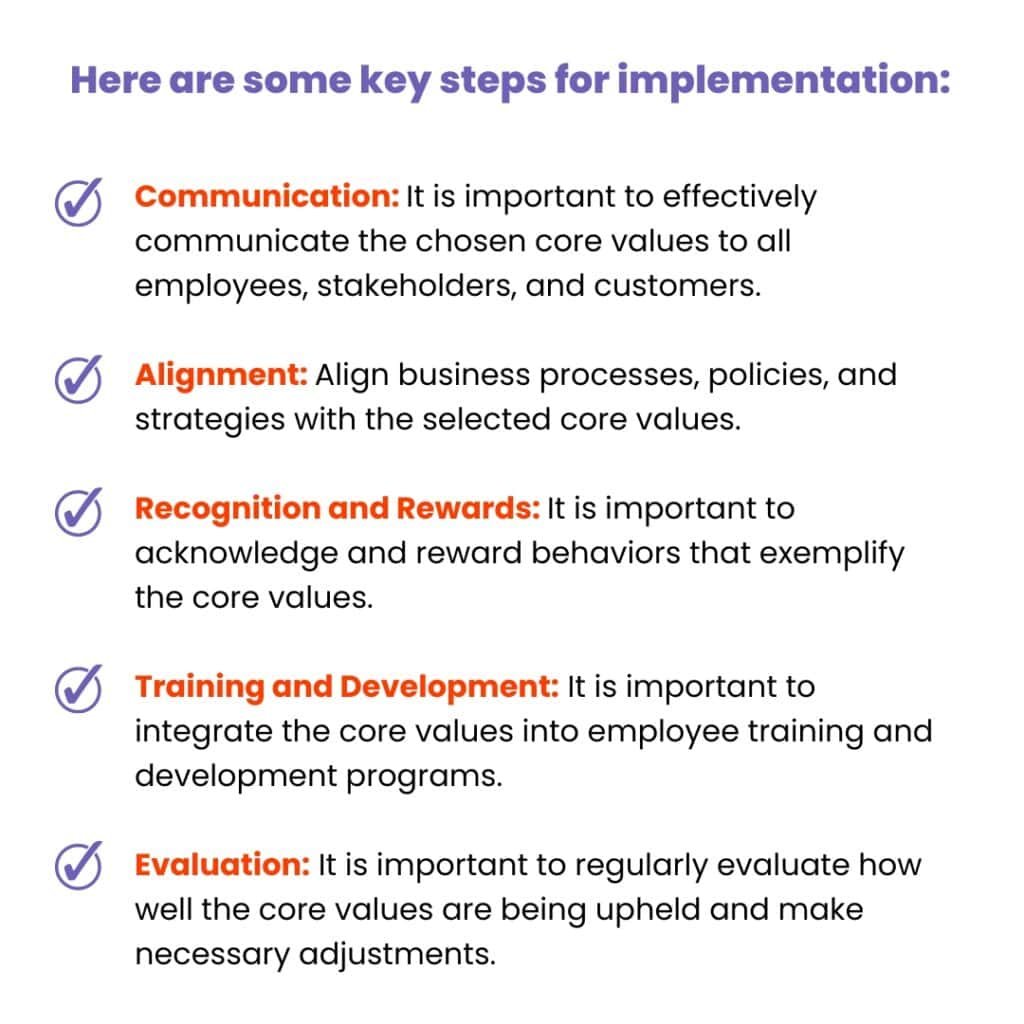In today’s highly competitive business landscape, a company’s success extends beyond its products or services. A strong corporate culture, built on well-defined core values, can significantly impact the long-term growth and sustainability of any organization.
Core values serve as a compass, guiding a company’s decisions, actions, and relationships. But how do you go about selecting the most appropriate set of core values for their company? We’re going to delve into the process of choosing core values and present a carefully curated list of 20 values, along with their meanings, to help you in this important endeavor.
What Are Company Core Values?
Core values are the fundamental beliefs and principles that drive an organization’s behavior, shape its culture, and define its identity.
These values encapsulate the company’s guiding principles and serve as a reference point for decision-making at all levels. They not only align employees and stakeholders but also establish a unique identity that differentiates the company from its competitors.
Why Are Core Values Important?
Company core values provide a guiding framework for decision-making, shape organizational culture, and differentiate the company in the market.
1. Guiding Decision-Making and Behavior: Core values serve as a compass for employees, providing a clear framework for decision-making and behavior within the organization. When faced with difficult choices or ambiguous situations, employees can refer to the company’s core values to align their actions with the organization’s principles and goals. This consistency in decision-making fosters trust, clarity, and unity among team members, leading to a cohesive and purpose-driven work environment.
2. Shaping Organizational Culture: Core values define the company’s identity, its vision, and the desired behaviors and attitudes of its employees. When core values are effectively communicated and reinforced, they guide employee interactions, communication, and collaboration, creating a positive and inclusive work environment. A strong culture rooted in shared values enhances employee engagement, job satisfaction, and retention, while attracting like-minded individuals who align with the company’s purpose.
3. Differentiation and Brand Building: When customers, partners, and stakeholders can clearly identify and connect with a company’s values, it builds trust, loyalty, and credibility. The alignment of the company’s actions and decisions with its stated core values helps establish a strong brand reputation in the market. Customers are more likely to choose a company that demonstrates values with which they resonate, leading to increased customer acquisition and retention. They can also attract top talent who share the company’s beliefs and are passionate about contributing to its mission.
Choosing Core Values
Here are some sample core values that may be suitable for your organization:
1. Integrity: Acting with honesty, transparency, and strong moral principles.
2. Innovation: Embracing creativity and cultivating a culture of ongoing improvement.
3. Collaboration: Encouraging teamwork, open communication, and mutual support.
4. Customer-centricity: Placing customers at the forefront and providing exceptional experiences.
5. Accountability: Taking ownership of responsibilities and delivering on commitments.
6. Respect: Treating everyone with dignity, fairness, and empathy.
7. Excellence: Striving for exceptional quality and high standards in all endeavors.
8. Sustainability: Committing to environmental and social responsibility.
9. Adaptability: Embracing change and being receptive to new ideas and approaches.
10. Empowerment: Encouraging and enabling employees to take initiative and make decisions.
11. Diversity and Inclusion: Embracing differences and creating an inclusive work environment.
12. Trust: Establishing trust by being reliable, consistent, and transparent.
13. Passion: Fostering enthusiasm and dedication in all aspects of work.
14. Growth: Continuously learning, developing, and seeking personal and professional advancement.
15. Responsibility: Taking responsibility for the impact of actions on employees, customers, and society.
16. Flexibility: Being adaptable and respond to changing market dynamics.
17. Authenticity: Being genuine, honest, and true to oneself and the company’s values.
18. Teamwork: Working collaboratively to achieve common goals and objectives.
19. Leadership: Inspiring, guiding, and empowering others to achieve greatness.
20. Fun: Embracing enjoyment and fostering a positive work environment.
Each of these core values contributes to a strong company culture and shapes the overall character of the organization. It is crucial to evaluate your company’s mission, vision, and goals when choosing the most suitable values. Additionally, involving employees in the process through surveys or workshops can help to ensure their buy-in and create a sense of ownership.
How to Implement Core Values
Selecting core values is only the first step. For effectiveness, it is essential to integrate them into all aspects of the company’s operations.
Get Valuable
The commitment to core values is a continuous process and cannot be approached with a “one size fits all” mentality. Corporate core values provide guidance for decision-making, serve as an evaluation tool, strengthen work relationships, increase employee loyalty, attract new talent, and foster customer trust.
For additional advice for hiring managers, please visit our resource center.






